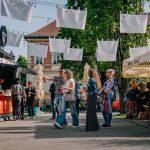ZAGREB, December 29, 2019 – In 2019 Croatian officials had to defend the country’s foreign policy from criticisms that Croatia was unlawfully returning migrants to Bosnia and Herzegovina, the country prepared for presidency over the EU in 2020, hosted a conference of the 16+1 initiative and lobbied for the appointment of Croatian women to important international positions, with the usual tensions in relations with neighbouring countries falling into the background.
Croatia will take over the chairmanship of the Council of the European Union on 1 January 2020, and that will be the most important foreign policy event for the country since its accession to the EU in 2013.
Zagreb will take over the rotating EU presidency at the very beginning of the term of the new European Commission, led by German Ursula von der Leyen for whose appointment credit also goes to Croatian Prime Minister Andrej Plenković, who, as one of the European People’s Party (EPP) negotiators, insisted that the position of EC President should go to the EPP as the winner of the May 2019 elections for the European Parliament.
Brexit is expected to be finalised during Croatia’s EU presidency, which will also be marked by discussions on the new EU budget.
A large part of Croatia’s diplomatic activities, notably in the second half of 2019, therefore related to acquainting oneself with the programme of EU presidency and adjusting it with other European countries.
An important topic in that was the situation in Southeast Europe and EU enlargement to Western Balkan countries. Zagreb will therefore use its presidency to organise a new summit on EU enlargement to Western Balkan countries, 20 years after such a summit meeting was held in the Croatian capital city.
The summit will be held in May, about seven months after the European Council decided not to launch membership talks with Albania and North Macedonia, a country that agreed to change its name over its membership in Euro-Atlantic associations.
The Croatian political leadership has been repeating since October that it regrets that decision.
German Chancellor Angela Merkel defended Zagreb in May from frequent accusations that it was violating the rights of migrants trying to cross over from Bosnia and Herzegovina, stressing that the perspective of a country protecting the EU’s external border was different from the perspective of countries in the heart of the Schengen area.
Even though the Croatian political leadership dismissed allegations that it was pushing back migrants, at the time when it had to prove to the European Commission that it was capable of protecting the EU’s external border, Croatia was a topic in international media over allegations that it violated migrants’ rights and pushed them back.
A Swiss TV station in May ran a video showing Croatian police officers forcibly returning migrants to neighbouring Bosnia and Herzegovina.
Human Rights Watch in July asked President Kolinda Grabar-Kitarović in an open letter that Croatia stop pushing back migrants, and the president admitted in an interview with a Swiss TV station that the practice of pushbacks over the green border did exist.
Amnesty International joined in the criticism, and Croatia’s treatment of migrants was also reported about by Reuters, the BBC, The Guardian, Euronews, Foreign Policy, etc.
The Croatian authorities dismissed all criticisms, claiming that migrants were treated lawfully.
The Croatian government sought support for its accession to the Schengen area in dialogue with other countries. In late October the EC assessed that Croatia had met the necessary criteria.
It is now up to other European countries to decide if Croatia will join the area and Slovenia has already said, more or less directly, that it will make its support conditional on Croatia’s agreeing to implement a ruling by an international arbitral tribunal on the two countries’ border dispute. Bulgaria and Romania have had a positive assessment from the EC since 2011 but have still not joined the Schengen area, which is why it is yet to be seen what awaits Croatia on that path.
After Croatia’s talks with the European Central Bank, the EC and member-states, the euro group in October accepted a letter of intent from Croatia on joining the European Exchange Rate Mechanism, ERM II, a step that precedes the introduction of the euro as the official currency.
In 2019 a woman from Croatia was appointed for the first time the leader of one the biggest multilateral international organisations – Foreign and European Affairs Minister Marija Pejčinović Burić in June defeated her Belgian counterpart and became the Secretary-General of the Council of Europe, an organisation established in 1949 that brings together 47 European and other countries but before Pejčinović Burić had only one other woman at its helm.
Pejčinović Burić was succeeded as foreign minister by Gordan Grlić Radman, until then Croatia’s ambassador to Germany.
In November Croatia also got its first woman European Commission Vice-President, with EPP member of the European Parliament Dubravka Šuica becoming one of eight EC vice-presidents, in charge of democracy and demography.
This year Croatia also got an executive director of an EU agency when Maja Markovčić Kostelac in January took over the leadership of the European Maritime Safety Agency (EMSA) in Lisbon.
Croatia in 2019 hosted several political meetings. In April Dubrovnik hosted a summit meeting of the 16+1 initiative, launched with the aim of strengthening economic cooperation between China and eastern Europe. After Greece joined the platform in Dubrovnik, it was renamed 17+1.
Attending the Dubrovnik conference were the prime ministers of almost all participating countries, including Li Keqiang of China, who arrived for the event accompanied by a large delegation of politicians and business people.
Li said that Croatia and China had entered a diamond stage of their relations, and together with his host, Prime Minister Andrej Plenković, toured the construction site of the 2.08 billion kuna Pelješac Bridge, which is being built by the China Road and Bridge Corporation and which the EU is co-financing with 85% of the necessary funds.
In May, ahead of elections for the European Parliament, German Chancellor Merkel and Manfred Weber, at the time still the EPP’s lead candidate for the position of EC President, arrived in Zagreb for a rally of the Croatian Democratic Union (HDZ) and the EPP.
Addressing the event, the two German officials condemned nationalism as an adversary that aimed to destroy Europe and that had caused tragedies in the past. At the rally, music by Croatian pop-rock singer Marko Perković Thompson was played, which met with the criticism of some German media outlets.
Chancellor Merkel did not know which songs would be played at the Zagreb rally or their content, her office said later in response to a query from the N1 broadcaster, adding that during her visit to Zagreb, Merkel had expressed a clear stand against nationalism.
The EPP in November held a congress in Zagreb. More than 2,000 participants from 40 countries attended, including von der Leyen, Merkel, Weber, Sebastian Kurz and Silvio Berlusconi.
Former European Council President Donald Tusk was elected the new EPP president at the event.
More news about Croatian foreign policy can be found in the Politics section.








